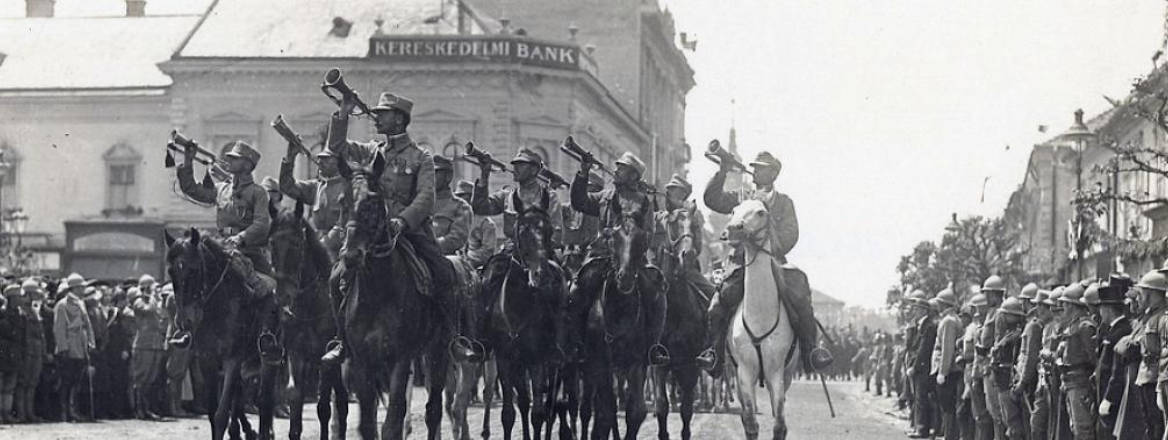The end of war commemorations in the UK and other western countries has little bearing on the feelings and historic memories of the Central and Eastern European states
At the eleventh hour on the eleventh day in the eleventh month, the guns fell silent throughout Europe, and the historic reckoning about the significance of the ‘Great War’ – that war-to-end-all wars – started. ‘The ending, in its ferocity, bloodiness, and uselessness, contained the entire war in microcosm. The fighting went on for the hollowest of reasons: no one knew how to stop it’, an American historian pointed out decades later, summing up what, for the generations which followed that frosty winter day of 1918 continues to be the prevailing view of the First World War.
But this is a very western perception. For in the eastern half of the European continent, 11 November 1918 is remembered not as the day when wholesale carnage ended, but the moment when the real fight only begun. It was a bitter, heroic fight which marked the historic experience of that region forever, and which contains some useful lessons that are as relevant today as they were a century ago.
It is crucial to recall that, while the preoccupation of British politicians on Armistice Day was to rejoice for a few hours and then run to the hustings for a new general elections – the so-called Coupon Elections which took place the subsequent month in 1918 – and while politicians in France were busy preparing schemes to ensure that Germany was kept prostrate forever, the leaders of every Central and Eastern European country were fighting for the survival of their own countries.
The topsy-turvy, desperate fight of the Poles to re-establish their own state and recreate their shattered nation only begun on 11 November, as another article published on this site today recalls. But on the southern part of Europe, the Romanians were facing the same dilemma, namely that, while the guns fell silent in the West, they were only beginning to roar in the East. Having entered the war on the side of the Allies in August 1916 – an event which gave the German Kaiser the first premonition that Germany may lose the war – the Romanians were defeated by the Central Powers by the end of 1916, and remained under a German occupation right up to Armistice Day.
But for Romania, the Armistice Day did not just mean the end of that occupation; it also meant the start of a battle for territory with Bolshevik Russia, and a communist-led attack from Hungary, where a ‘soviet’ momentarily seized power. Like Poland, Romania had to fight on both its eastern and western flanks at the same time. Like Poland, it ended up as the beneficiary of the simultaneous collapse of no less than three empires: the Russian, German and Austro-Hungarian. Poland and Romania – the region’s largest states – spent the subsequent two decades trying to protect their borders from predators emerging from both east and west. Both failed; by 1939, Hitler and Stalin, those 20th Century monsters, carved them up. Still, for both Poland and Romania, 11 November 1918 does not represent the end of a story, but just its beginning. Their days of glory were not behind them, but lied ahead.
The same applies to the state of the Czechs and Slovaks, which came into being soon after that fateful November day. And the same happened to the kingdom of the Serbs, Croats and Slovenes, which emerged soon after the end of the war. In all these countries 11 November was, as the French national anthem so memorably put it, ‘le jour de gloire est arrive’. Not everyone triumphed in that period of ‘glory’. The Georgians, Armenians, Azeris and Ukrainians – to mention but a few – tried to create their own states, but failed; they were condemned to repeated Soviet genocides and had to wait for a further seven decades before tasting independence.
And it is equally important to recall that, for the defeated states of Central and Eastern Europe, that November a century ago represented one of their darkest period. Just think of Vienna, one day the capital of a mighty empire and the next day the oversized capital of a small Austrian state, the collection point for millions of flea-ridden refugees, most of them starving. And spare a thought for the Hungarians who, within a few months after the Armistice, lost no less than two-thirds of their territory, but also suffered the ultimate ignominy of having their capital of Budapest occupied by the troops of Romania, that Balkan neighbour the Hungarians used to dismiss with contempt. Devastation, famine, disease and death were rife throughout the region on an unimaginable scale that few bothered to document at the time, or subsequently record for posterity. Apart from specific histories of the states of the region, the only way of reconstructing the horrors of that time is by leafing through the yellowing pages of the American Relief Administration run by Herbert Hoover, a future US president; this is yet another one of these historic moments which are best observed from the vantage point of the ‘New’, rather than the ‘Old World’.
What other memories – apart from those of sacrifice and suffering– do the countries of Central and Eastern Europe carry about that Armistice Day a century ago? First, a feeling that they were neglected by their western allies. French General Franchet d'Espèrey, who commanded no less than 26 divisions and staged a successful offensive that ended by taking Bulgaria out of the war, overrunning the Balkans and triggering the November 1918 armistice by effectively bringing about the collapse of the Great War’s Southern Front, was swiftly told by his political masters in Paris to halt and take no part in the ‘quarrels’ then unfolding between France’s former allies.
All the states of the region were told to stop where they were and wait for the peace conference at Versailles, which in turn took months to organise since US President Woodrow Wilson insisted on being present. Not one of the region’s states heeded that advice, for a simple reason: they were fighting for their survival, and could not afford to wait until that learned American professor deigned to cross the Atlantic Ocean. Not one of the Central and Eastern European countries was treated seriously at the peace conference; they were all regarded as part of the problem rather than the solution, supplicants rather than partners. And although the various treaties concocted at that conference – chiefly the Trianon and St Germain treaties – purported to fix the frontiers and future disposition of the eastern half of the continent, in reality it was brute force and haphazard circumstance which decided the frontiers of every central and eastern European country.
Ultimately, however, neither Britain nor France saw it as their particular obligation to underwrite security in ‘the east’. France’s obsession was to create a ‘Cordon Sanitaire’ which would envelop Germany from the east, and act as a substitute to Russia in containing German might. Britain, however, always regarded this project as a folly, and one in which London refused to engage. The seeds of Britain’s 1930s appeasement policies were probably planted right there, in November 1918, in London’s steadfast refusal to accept that European security was indivisible, and that the countries of the east had an intrinsic security value in themselves, and were full actors, rather than mere spectators, in the continent’s violent convulsions.
That realisation only came in the early 21st Century, when the states of Central and Eastern Europe were fully integrated into European security and economic structures. And, true to form, Britain’s response is now to leave one of these key European security pillars.
The views expressed in this Commentary are the author's, and do not necessarily reflet the views of RUSI or any other institution.
WRITTEN BY
Jonathan Eyal
Associate Director, Strategic Research Partnerships
RUSI International


